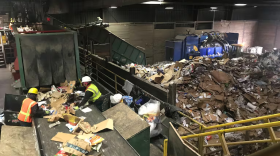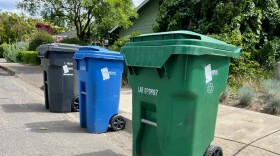This story originally appeared in the Oregon Capital Chronicle and is used with permission.
The $8 trillion wholesale product distribution industry is challenging a four-year-old Oregon recycling law weeks after the law took effect.
The Plastic Pollution and Recycling Modernization Act, passed by the state Legislature in 2021, was meant to create statewide standards for what can and cannot be recycled and established new packaging fees for companies that sell products in Oregon. The fees, based on the weight and recyclability of the material, are meant to require product manufacturers and distributors to cover some of the end-of-life costs for disposing of their packaging — costs that are currently borne by the businesses and Oregonians who have to pay for the garbage.
Products with less packaging and with reusable packaging carry lower fees than goods packaged in bulky plastics and single-use materials, ideally encouraging producers to choose lighter, more sustainable materials. It follows regulations in Oregon in recent years that require manufacturers to pick up some of the end-of-life costs of paint, mattresses and electronics, or to invest in programs to recycle such products.
But on July 30, about three weeks after the law was implemented and manufacturers received their first bills, the National Association of Wholesaler-Distributors sued the state in U.S. District Court in Portland to stop it from continuing, claiming the law is unconstitutional. The association is a trade group representing what it says is the $8.2 trillion wholesale distribution industry.
The Oregon Department of Environmental Quality, Environmental Quality Commission and State Attorney General Dan Rayfield are named as defendants in the suit.
In emails, spokespersons for Rayfield and the Environmental Quality Department said they cannot comment on pending litigation.
Shifting the burden
The wholesale distributors claim the law is unconstitutional because, as it’s structured, it gives regulatory authority over the fee schedule and collection not to the state’s environmental quality department but to a private entity — the Circular Action Alliance, or CAA — a nonprofit based in Washington, D.C.
Twenty multinational corporations in the food, beverage, retail and consumer goods industries, including Amazon, CocaCola and Nestle, formed the alliance in 2022. It oversees similar recycling fee programs that are rolling out as a result of new policies in California, Colorado, Maine and Maryland.
In Oregon, the alliance is in charge of setting and collecting fees for 60 different material categories based on weight and recyclability. Along with local governments, the alliance participates in choosing where to invest the revenue from those fees, which must be projects that improve Oregon’s recycling infrastructure.
Eric Hoplin, the wholesaler association president and CEO, said in a statement on the group’s website that Oregon’s law is unfair because it shifts undue burden for disposal costs to distributors who don’t get to make packaging choices.
On June 4, officials from the group asked the state’s environmental quality department to delay enacting the law for another year, despite more than a year of public comment and rulemaking the department undertook before fully launching and enforcing the regulations.
“Rather than encourage sustainability through a uniform and transparent system where compliance burdens are shared across industries, Oregon chose to shift the burden to the parts of the supply chain that have little to no control over decisions to design, reduce, reuse or recycle a product,” Hoplin said.
In their suit, the group’s lawyers claim that Oregon’s law discriminates against out-of-state producers and violates state and federal due process laws. The lawyers claim the fee-setting methodology used by the Circular Action Alliance has not been publicly disclosed, debated or subject to rule-making and that companies forced to pay it were not given the chance to challenge it or resolve disputes.
“For many, particularly for small and medium-sized businesses operating on thin margins, the fees were unexpected and unexpectedly high,” they wrote in their filing.
The law exempts producers who earn $5 million or less in gross revenue.
State Sen. Janeen Sollman, D-Hillsboro, who co-sponsored the recycling modernization law back in 2021, said in a statement that the law is supposed to bring more fairness to Oregonians who have been on the hook for disposal costs of product packaging for years.
“If a producer creates more packaging waste, a producer will pay more for the disposal of the waste, not Oregonians,” Sollman said. “Oregon’s residential customers and small businesses are bearing the greatest burden of the rising cost of waste.”
Sollman said the “multi-trillion-dollar industry” is “fighting for profit, not for Oregonians. The lawsuit they filed Wednesday threatens our progress toward a cleaner, more sustainable Oregon.”




